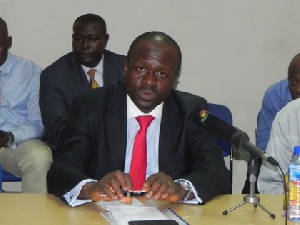Minister of Communications, Dr. Edward Omane Boamah has said the claims by telecom operators that they are providing nationwide coverage are a ‘deception’.
“When I see the telcos advertising and showing a map of Ghana and indicating that they provide nationwide coverage I get disturbed because none of these companies provides nationwide coverage – no one telco can stand up and say I cover the whole of Ghana,” he said.
The Minister was speaking on Asempa FM’s Ekosiisen about a wide range of telecom and ICT industry issues.
He said it was important that each of the telcos told Ghanaians the extent of their coverage so people could make informed decision on which network to be on.
“If I am buying a SIM card I need to be told where I can get coverage and where I cannot so that I can decide which network suites my needs and which one does not,” Dr. Omane Boamah said.
The Minister is therefore cautioning the telcos to re-tweak their marketing communication and commercials, and tell Ghanaians the real truth about the extent of their coverage, adding that “we have told each of them to do the right thing and we will insist on that.”
In spite of the heavy investments telcos have made to expand coverage and improve network quality, there still remain certain locations across the country, and even in the national capital where customers completely lose coverage once they enter those locations. A typical example is around Teshie beach in Accra.
But the telcos are of the view that once they have presence in every region and district in the country their claim to nationwide coverage is valid.
It is also not a secret that the quality of telecom service in Ghana is not the best in terms of customer experience. But each of the telcos has not seized making claims about having the best quality of service in comparison with each other.
While the telcos point to common and genuine challenges such as rampant fibre/cable cuts and theft, power fluctuation, non-issuance of permits to install infrastructure and others as factors which affect quality of service (QoS) across board, they also seem to compete with each other on claiming to be best on QoS, even when it is obvious customer experience leaves much to be desired.
Some Ghanaians have therefore resorted to social media to register their anger about why the industry regulator, National Communications Authority (NCA) only crack the whip on telcos when they default on QoS standards, but stood by and watched them [the telcos] make ‘wild’ and ‘untrue’ claims in their marketing communications about their coverage and QoS.
But the Minister said the days of communicating messages that are not in line with the reality of customers’ experience are over.
He had earlier hinted that if telcos did not stop deceiving everybody about the extent of their coverage and actually provide nationwide coverage, government would not hesitate to introduce domestic roaming to ensure that every Ghanaian got service wherever they find themselves in Ghana.
"I have also asked NCA to publish the QoS reports in a way that would make the public know which telco has the best QoS in each locality so that people would decide port to particular networks base on who is best and who is worst," he said.
Ultimatum: “No mercy for the cripple”
Dr. Omane-Boamah also gave an ultimatum to the telcos that they all have up to the close of the year to generally improve service quality or the NCA would continue to crack the whip even harder.
“I have visited all the telcos and they have each promised that they are reinvesting between 15 and 18% of their revenues into network improvement to boost service quality and they have up to the end of the year to show us some level of improvement or there will be no mercy for the cripple,” he said.
He explained that the telcos had contracts with each of their customers, which require them [the telcos] to provide the level of service quality they promised, particularly under the prepaid arrangement, where the customer pays for the service before using it.
Dr. Omane Boamah however admitted that some of the challenges facing telcos, such as fibre/cable cuts are genuine concerns, saying that the National Security Secretariat had recently intervened and established an arrangement between telcos and road contractors to prevent further fibre cuts.
He also observed that galamsey operations [illegal mining] is fast emerging as a major cause of fibre cuts, particularly in the Western Region, and government is working with the necessary stakeholders to stem that too.
“Some galamsey operators deliberately cut the telecom fibre because they believe there is copper in it but we are educating them that there is no copper in the fibre so there is no need to cut them.”
“If we have to go to Parliament to get a Legislative Instrument to ban the export of copper from Ghana we will do because we need to discourage the rampant fibre cuts by people who think they can find copper to sell,” the minister said.
Meanwhile, engineers from the telcos, roads, water, energy, and the lands and forestry sectors have constituted the National Engineering Coordinating Team (NECT) to harmonize infrastructural development in the country.
NECT ensures that all utility service providers like the telcos, water and electricity install their infrastructure while roads are being constructed to prevent digging after the roads are completed. It also ensures that when there is need for relocation of cables, it is done within laid-down procedure under the supervision of National Security.
ADOMBUSINESS reached all the telcos to speak to the minister’s charge but none of them have since responded.
Business News of Saturday, 21 September 2013
Source: Adom Business













